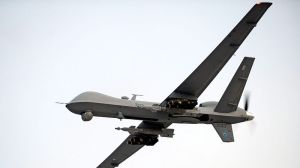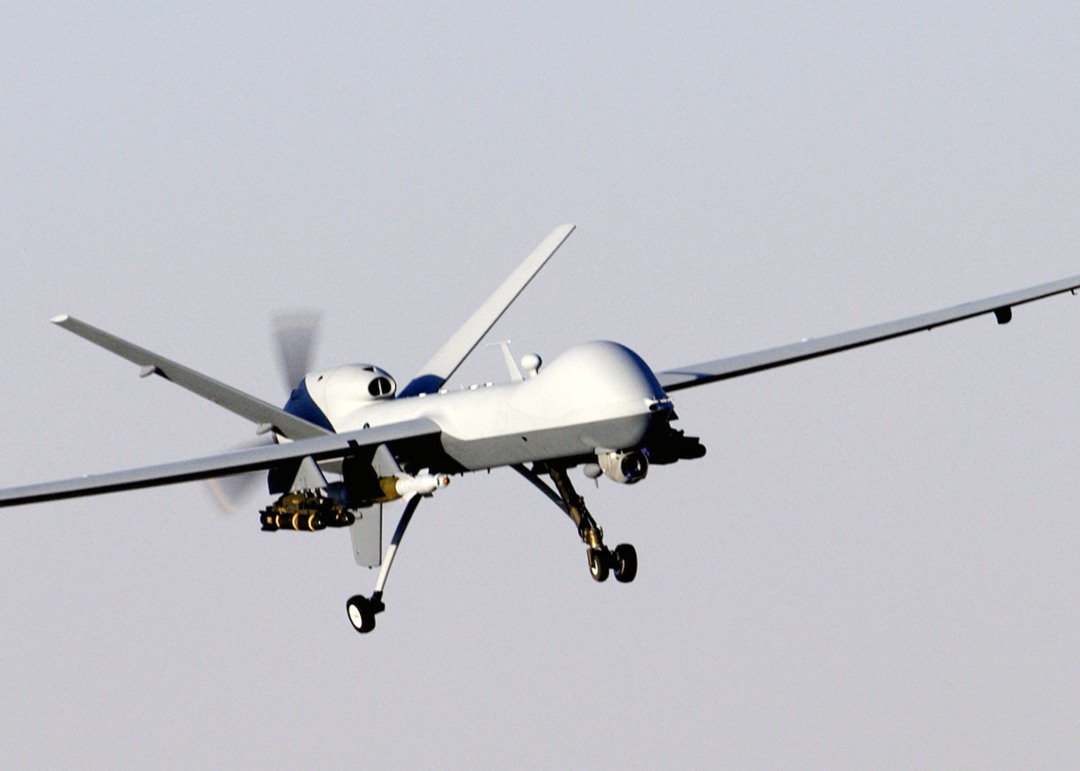Back in 2015, forty-five former US Military personnel wrote a letter calling for the pilots of the controversial unmanned aircraft to step away from their controls and refuse to carry out their missions. The appeal came as part of the campaign “Refuse to Fly” set up by KnowDrones.com who have also aired TV commercials in areas close to air force bases urging pilots to quit their desks at drone mission control. The members claim that the missions these pilots are undertaking “profoundly violate domestic and international laws” and that “At least 6,000 lives have been unjustly taken by US drone attacks in Afghanistan, Iraq, Syria, Libya, Pakistan, Yemen, Somalia and the Philippines”.
Whether you agree with the use of armed military drones or not, it is hard to escape the reality that these machines are becoming a more and more popular deadly accessory to the armed forces of the world. China, France, Germany, Iran, Israel, Italy, Russia, Turkey, the US and the UK all have their own drone programmes and all but Iran posses “heavy” drones such as the MQ-9 Reaper or MQ-1B Predator. These are the ones capable of firing those nifty Hellfire missiles in order to obliterate anything or anyone within its blast radius. When it comes to numbers, things become a little hazier. The US is most open about the size of its drone army with data suggesting just short of 700 known machines in operation in 18 different variations. Chinese and Russian figures are altogether unknown and the UK is thought to possess three different types of drone and at least 10 MQ-9 Reapers. 
When it comes to any kind of moral debate on the use of drones, the advantages always seem to come across as more obvious than the disadvantages, after all, who in their right mind would rather put a human directly in the line of fire over a now inexpensive piece of technology? While it is true that heavy drones could replace armed troops, could they replace human intuition and intelligence? Is it wise, in the context of taking a life, to replace emotionally capable human beings with indifferent programmed machines? With our technological abilities progressing ever faster, how long could it be until we are deciding as to whether to let the machine make that kill decision for us as well?
When western media reports on war, the focus very much seems to be on the “home team”, how is are our side doing? The news we see tends to be about why we are at war, who we are at war with and how many of our soldiers will we have to dig graves for? There is very little attention paid to those suffering thousands of miles away and the devastating effects war has on them. In fact, the lives of indigenous populations are often treated as lesser than those of the people supposedly “liberating” them, so much so that when innocent people are killed by “friendly” forces it isn’t murder, it’s “collateral damage”. Collateral damage is a term used by officials to mitigate damage to public opinion whilst still admitting to having murdered innocent people. The fact such a phrase has been invented and is used to describe such occurrences, whether accidental or through negligence, shows an apparent uncaring indifference to their suffering.
This “empathy gap” is one of many new problems faced by those engaging in drone warfare. The effects of sitting in a control room, thousands of miles away from your allocated enemy and having to press a button watch their (and likely others) deaths over and over again are unstudied. The way these situations affect morale is as yet unknown, however, in 2014 it was reported that more drone pilots were quitting the armed forces than were being recruited and trained. Could this be due to an as yet unrecognised cognitive dissonance amongst drone pilots? Are their psychological cracks beginning to show? We can only hope this trend alerts those in command to re-evaluate their use of heavy drones, however, given the current public opinion of drones being that of seeming indifference, this would seem unlikely.
Herein lies the problem; if drones ultimately replace boots on the ground and we stop hearing reports of our troops fighting and dying overseas, is the phrase collateral damage enough for us to keep our governments and militaries in check? Do we still care about the damage being done in our name by drones? There is also a worrying lack of information on civilian casualties caused by drone strikes and, so far, no apparent obligations to report such casualties. Western governments, particularly the UK, have come under fire to be more open about their drone programmes, however, the same limp excuses are touted, “We don’t comment on intelligence operations”.
Should we all be demanding more accountability from the people representing us as nations? With accusations of violations of domestic and international laws, coupled with Edward Snowden’s release of classified GCHQ documents raising questions about Britain’s role in drone strikes outside of recognised war zones, should we allow policy makers to hide from their decisions? The use of drones in Yemen, Pakistan, Somalia and so on is deeply resented within these countries and this resentment combined with the people’s own personal experience offers extremists all the recruitment tools they need in order to radicalise the next generation of potential Reaper targets. When viewed from this perspective, the line “We don’t comment on intelligence operations” appears ridiculous and an attempt to keep the debate out of the public arena.
Drones possess the ability to change the way wars are fought, for this reason alone they should be held to the highest scrutiny. Whilst there is no doubt fewer people fighting in wars is a good thing, replacing them with unthinking, unfeeling robots and piloting them from the comfort of your nearest air force base sounds like it will cause more problems than it will solve. The empathy gap is a perfect example of this, if there are no unpopular wars for the public to create pressure on politicians to withdraw from, what’s to say they ever will? War is one of the most lucrative industries on the planet, any technology that could give rise to the proliferation of proxy wars for profit should have it’s uses evaluated thoroughly and within the public domain.
More From This Author:
Reshaping The Way Money Works: Money for You and Me, Not Markets
UK Fracking: Job Estimates “plucked out of thin air”
UK Government’s Plans To Silence Whistleblowers In “Full-Frontal Attack”

